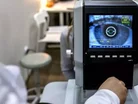FDA accepts new medical device harnessing AI to detect diabetic retinopathy

The US Food and Drug Administration has accepted the marketing of the first medical device to use artificial intelligence to detect greater than a mild level of the eye disease diabetic retinopathy in adults who have diabetes.
Diabetic retinopathy occurs when high levels of blood sugar lead to damage in the blood vessels of the retina, the light-sensitive tissue in the back of the eye. It is the most common cause of vision loss among more than 30mn Americans living with diabetes and is the leading cause of vision impairment and blindness among working-age adults.
“Early detection of retinopathy is an important part of managing care for millions of people with diabetes, yet many patients with diabetes are not adequately screened for diabetic retinopathy since about 50% do not see their eye doctor on a yearly basis,” said Malvina Eydelman, M.D., Director of the Division of Ophthalmic, Ear, Nose and Throat Devices at the FDA's Center for Devices and Radiological Health.
See also
- Sanofi invests €350mn in new vaccine facility in Toronto
- Could cannabinoids have a place in paediatric care?
- Using 3D printing to make implants smart
“Today’s decision permits the marketing of a novel artificial intelligence technology that can be used in a primary care doctor’s office.”
The device, IDx-DR, is a software program that uses an artificial intelligence algorithm to analyse images of the eye taken with retinal camera, Topcon NW400. A doctor uploads the digital images of the patient’s retinas to a cloud server on which IDx-DR software is installed.
If images are of sufficient quality, the software provides the doctor with one of two results: (1) “more than mild diabetic retinopathy detected: refer to an eye care professional” or (2) “negative for more than mild diabetic retinopathy; rescreen in 12 months.” If a positive result is detected, patients should see an eye care provider for further diagnostic evaluation and possible treatment as soon as possible.
IDx-DR is the first device authorised for marketing that provides a screening decision without the need for a clinician to also interpret the image or results, which importantly, makes it usable by health care providers who may not normally be involved in eye care.
- Resilience & Reform Needed to Guard Healthcare Supply ChainsMedical Devices & Pharma
- Abbott Labs' profits soar; Nipro opens First US FacilityMedical Devices & Pharma
- Nestlé Health Science Targets Weight Loss Side-EffectsMedical Devices & Pharma
- Costco Weight-Loss Drugs Move Highlights US AOM GrowthMedical Devices & Pharma



